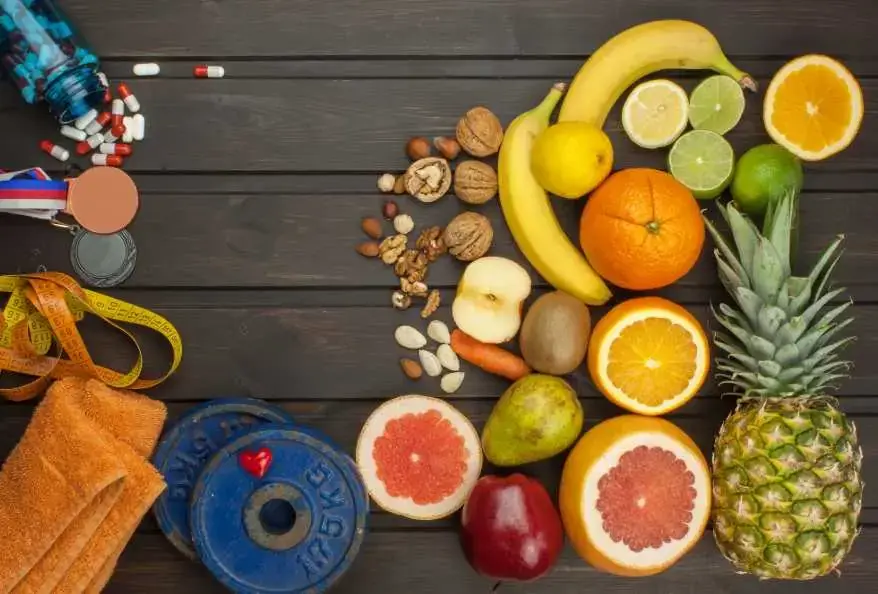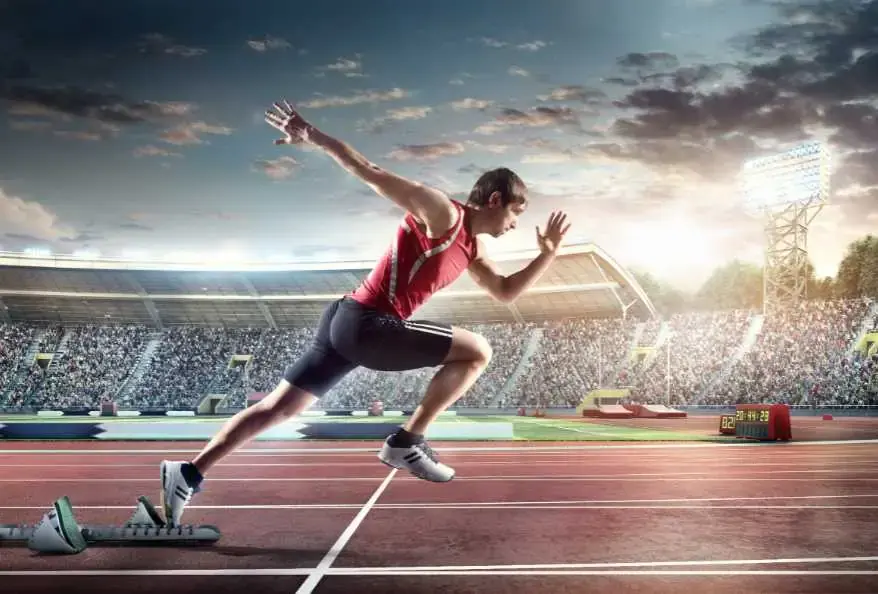Nutrition and Performance for Athletes: The Ultimate Guide
Estimated reading time: 8 minutes
Nutrition is a critical factor in athletic performance, impacting energy levels, muscle recovery, and overall health. Nutrition and athletes are greatly linked .Nutrition energize the body for adequate performance and improves recovery . These organizations recommend selections of food and fluid that provide athletes with adequate energy and nourishment to sustain high-intensity training, promote recovery. Some of this nutrients are: carbohydrates, proteins, fats, minerals, electrolytes.
Poor nutrition can significantly impact the performance of athletes. Knowing the connection between nutrition and performance is important for archiving good results .Athletes of all levels, youth to professional, are turning to nutrition to improve the trajectory of their performance. These competitors encounter a wide range of nutritional recommendations and diet trends through exposure from social media, peers, and coaches, among other sources.
Proper nutrition can significantly enhance performance, while deficiencies or imbalances can hinder an athlete’s progress. Understanding how different nutrients affect athletes is crucial for optimizing their training and competition outcomes.
Nutrition for Athletes: Some Important Definitions
1. Nutrition:
Nutrition is the study of how the body uses food to maintain optimal health,growth, function and well-being, through the processes of ingestion, digestion, absorption, and utilization of nutrients.
2. Athlete:
This is an individual who is actively involved in sports often requiring specific training and pushing the body to further limits to enhance their performance.
3. Performance:
In the context of sports and physical activity, performance refers to the ability of an individual to be efficient in sports or physical tasks which require speed, strength, endurance, and timing.
4. Nutrients:
These are the substances found in food that the body needs to function properly and maintain overall health and performance. They are sub divided in to two as seen below;
i) Macronutrient:
These are nutrients that the body requires in large amounts to provide energy, build and maintain body structures, and regulate bodily functions. They include carbohydrates, proteins, and fats.
ii) Micronutrients:
These are nutrients needed in smaller quantities, but they are still essential for various bodily processes, including enzyme function, immune system support, and cell growth. These include vitamins and minerals.
Also Read: Introduction to Sports Sciences 101
Importance of Nutrients for Athletes and their Performance

Carbohydrates
These are the most essential and primary source is energy for athletes, especially during energy requiring exercises. Athletes need adequate amount of carbohydrate to replenish glycogen stored in the liver . Examples of food , tubers like Cassava, yam, potatoes, rice, wheat .
Protein
They are essential for growth and tissue repair . Athletes need protein to build and repair muscle tissue damaged during and after exercise. Examples of food, fish ,beans , meat, seeds and nuts.
Fats
They are necessary for energy production when broken down during exercise,hormone production, nutrient absorption. Examples of healthy fat sources are vegetable oil,pears, plums, groundnuts, and pumpkin seeds.
Vitamins and Minerals
They are essential for various bodily functions, including energy metabolism, bone health, and immune function. For example, iron is essential for oxygen delivery, Vit A for proper vision. Examples are vegetables , fruits, juices .
Electrolytes
Electrolytes like sodium, potassium, and calcium are lost through sweat, and athletes need to replace them to maintain proper hydration and muscle function. Can be gotten from home maid sport drinks, coconut water.
Also Read: Types of Nutrition and Role in Ecosystem
Impact of Poor Nutrition on Athletes Performance
Mental Impairment
Poor nutrition can affect cognitive function, impacting decision-making, focus, and reaction time, which are crucial for many sports.this affects the athlet and hence bad performance.
Psychological Effects
Deficiencies in nutrients needed for proper brain function, hydration and electrolyte balance can also contribute to lose of focus ,anxiety, and even depression, further affecting an athlete’s performance.
Impact on Bone Health
Deficiencies in calcium and vitamin D can lead to reduced bone density, increasing the risk of fractures, particularly in young athlet .Nutrient deficiencies, particularly calcium, vitamin D, and iron, can weaken bones and muscles, making athletes more susceptible to injuries like stress fractures and muscle strains.
Fatigue and reduced endurance
Fatigue is as a result of body weakness, lack orenergy. The primary and most essential source of energy is carbohydrate which is needed before the exercise for energy production, during, glycogen is used and after exercise, the glycogen is replenished from eating carbohydrates.
Delayed healing
Slow healing processes can be a result of lack of protein in an athletes diet. If any injuries are sustained during exercise, they might take longer to heal and increased susceptibility to illness thereby decreasing the athletes performance.
Weakened Immune System
Lack of essential nutrients in their required amount that make the system susceptible to infections and illnesses, weakening the immune system and hence bad performance of athletes.
Also Read: The metabolic Matrix.
Method for optimizing performance

Proper Hydration:
Adequate hydration is needed during and after exercise, for body maintenance that is proper sending of impulses and , removal of waste from the body.
Balanced Diet:
Eating food rich in nutrients, that is macronutrients (proteins, carbohydrates, and fats) and micronutrients (vitamins and minerals) provides energy for exercise and body tissue recovery.
Proper food timing:
An athlete should pay attention to what they eat , when they eat that is before, during and after every exercise as explained below;
- Before exercise: A balanced meal 2-3 hours before exercise can help optimize energy levels and increase performance.
- During exercise: Electrolyte-rich drinks can help maintain energy and fluid balance during high endurance exercises.
- After exercise: Protein and carbohydrates should be consumed soon after exercise to assist in muscle repair and glycogen replenishment.
Regular training:
This is important for athletes, to enhance their performance and it helps to keep the body healthy. Regular training make stage body fit at all times and help develop more strategic skills, strength and conditioning . These exercises may include, running, squats, deadlift and bench pressing.
Flexibility and Mobility:
Improving range of motion and joint stability helps prevent injuries and also enhances movement efficiency.
Meditation:
Mentally rehearsing and memorizing performance scenarios can improve focus as well as confidence.
Goal Setting:
Establishing clear, achievable goals undoubtedly provides motivation, direction and hope of better performance.
Mental strengthening:
Developing resilience, focus, and the ability to handle pressure is certainly crucial for performance under stress.
Focus and Meditation:
Techniques like mindfulness can help athletes stay present, reduce anxiety, and also improve focus.
Conclusion: Nutrition for Athletes
Proper nutrition plays a crucial role in improving athletic performance. By understanding the importance of macronutrients, micronutrients, hydration, and meal timing, athletes can not only fuel their bodies for peak performance, support recovery, but also achieve their goals. A good nutrition method can evidently help athletes perform optimally, reduce the risk of injury and illness, and gain good performance.
Additionally, to stay updated with the latest developments in STEM research, visit ENTECH Online. Basically, this is our digital magazine for science, technology, engineering, and mathematics. Further, at ENTECH Online, you’ll find a wealth of information.
FAQs: Nutrition for Athletes
1)What is the importance of nutrition for athletes?
A: Nutrition plays a crucial role in optimizing athletic performance, supporting recovery, and maintaining overall health.
2) What are the key macronutrients for athletes?
A: Carbohydrates, proteins, and fats are essential for energy production, muscle growth and repair, and overall health.
3)what is the role of hydration in athletic performance?
A: Drinking water is important when you work out. It helps your body not only stay cool, moves good things around, but also gets rid of bad things.
4) What role does meal timing plays in an athletes performance?
A: Meal timing can help improve performance by giving energy before exercise, during and ensuring recovery after exercise, and promoting muscle growth and repair.
5) What are some errors athletes make concerning their nutrition?
A: These errors may include insufficient hydration, poor food timing, inadequate carbohydrate intake and also insufficient electrolytes.
Disclaimer: We do not intend this article/blog post to provide professional, technical, or medical advice. Therefore, please consult a healthcare professional before making any changes to your diet or lifestyle. In fact, we only use AI-generated images for illustration and decoration. Their accuracy, quality, and appropriateness can differ. So, users should avoid making decisions or assumptions based only on the text and images.
References:
- Fitness and Sports Nutrition | National Agricultural Library. (n.d.). https://www.nal.usda.gov/human-nutrition-and-food-safety/fitness-sports-nutrition
- Purcell, L. (2013). Sport nutrition for young athletes. Paediatrics & Child Health, 18(4), 200–202. https://doi.org/10.1093/pch/18.4.200
- Sports and Nutrition: What athletes need to know | Mass General Brigham. (2024, July 10). https://www.massgeneralbrigham.org/en/about/newsroom/articles/sports-and-nutrition
